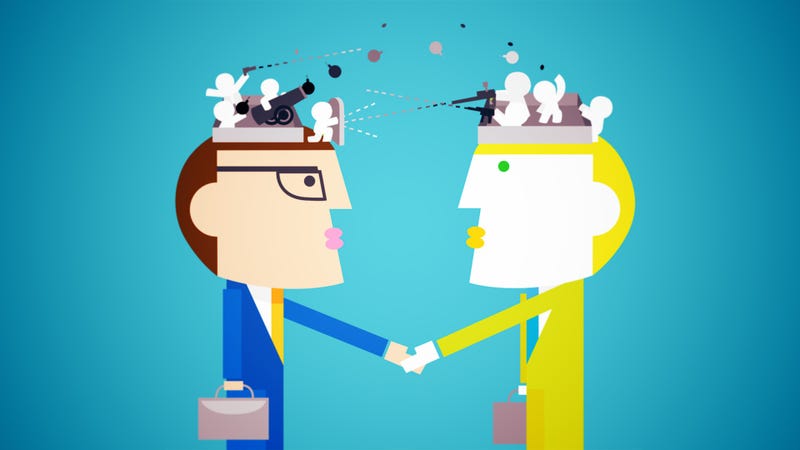

Each one of us knows of people who are great at listening and also feel happy in helping. They are the most optimistic ones around us. Not only that but they are the masters of emotions, and you too wish to adopt such abilities.
Did you know, emotional intelligence exhibits a direct and positive impact on making people this superior? However, the term is relatively new yet familiar, but we still don't know what is Emotional Intelligence (EI), what is the importance of emotional intelligence and which are the ways to enhance emotional intelligence along with the significance of emotional intelligence in the workplace. So let us find the answers here in this article.
Emotional Intelligence is a person's ability to recognize, understand and manage his/ her emotions in a suitable manner. It helps people to regulate not only their feelings but also their behavior. One is not only effective at dealing with self-emotions but also with the emotions of others. Emotionally intelligent people are productive in their working, they are always motivated, they believe in empathy, they are absolutely self-aware, happiness is their sword, and social skills are ever increasing. Such people exactly know when to be happy, when to be sad, when can they let out emotions, when to seek help, when are they anxious, how to serve their purpose and not to expect materialistic returns.

(Image Courtesy: Lynda)
#1. Emotional Intelligence helps you understand how to connect with people and motivate them for building stronger bonds as well as adapt to positive methods of doing so.
#2. Emotional Intelligence actually helps prevent procrastination. It improves your self-confidence and sharpens the focus. You learn to delay the gratification process for determining the long-term goals.

(Image Courtesy: Lynda)
#3. Emotional Intelligence plays a vital role in enhancing your career especially your leadership skills. You are highly motivated, feel productive and develop the feeling of commitment.
#4. You are the master of your own emotions and feelings, both in the workplace as well as at home or with friends.

(Image Courtesy: Lynda)
#5. Emotional Intelligence also helps a person to empathize with the viewpoints of other people. It not only helps you resolve conflicts but also understands the needs of other individuals.
#6. According to some experts, a person's Emotional Intelligence is also connected with his total well-being. One is more aware and able to manage his/ her stress levels and also take better care of their bodies.

(Image Courtesy: Human Engineers)
#7. You get privileged enough to have a greater outlook towards life. Ideally, such people are happier, deal with lesser mood swings and do not undergo problems like depression. You are one of those happy-go-lucky people who always maintain a positive attitude!
#8. When you are able to better understand your own emotions, you are also capable of managing your relationships in a more constructive way.

(Image Courtesy: LinkedIn)
#9. You get better and better at negotiating just for the reason that you have the ability to understand people more. And it is easier for you to give people what they want.
#10. You do not instantly dismiss your feelings and instead, take the time out to think about them. You do not just cut off the wave before it peaks.

(Image Courtesy: Notre Dame Online)
#11. You start realizing that you aren't always the best judge to your emotions. In certain cases, even others can help! You know the answers can be illuminating as well as surprising. But it's okay for you to accept them.
#12. Emotionally intelligent people know the fact that despite some feelings being uncomfortable, they have to face them. Interrupting or running away isn't the solution and that's what any person has to learn for progressing in life.

(Image Courtesy: Life Hacker)
#13. It's a valuable asset that helps you develop and enhance sensitivity, flexibility, selflessness, reduce arrogance and make you less volatile.
#1. Learn To Take Responsibilities For Your Behavior
It is probably the most challenging step you can ever take. But that's how you start. Start slow but at least initiate and sooner or later, you will definitely get there. You will also realize how beneficial it gets over the time.
Each emotion that comes out of you is the resultant of how you feel and what you feel. It is not anyone else's action. People do trigger your untouched strings, but the way you take them up is absolutely your call. So, start keeping a check on your emotions, feelings, and behavior. Don't hold others accountable for it. It will leave a positive impact once you take the responsibility of your emotions.

(Image Courtesy: High-Quality Free Clipart)
#2. You Don’t Always Need To React
One should effectively practice the art of responding and not always reacting in the opposite manner. Reacting is actually an unconscious way of dealing with the situation or expressing our emotions. One needs to pay attention to their feelings and accordingly decide how to behave. When you are totally aware of your response patterns, no triggers should affect your working.
For instance, when you know certain situations can easily make you throw anger, try distancing yourself from people before it actually happens and ruins the environment. Just take a break for yourself and calm the rumbling thoughts.

(Image Courtesy: Mark Manson)
#3. Try To Stay Humble
When you are practicing the art of staying humble and compassionate at just any stressful situation, that's how you take another step towards developing your emotional intelligence. Try and look at the situation with a different perspective.
You don't just have to concentrate on being judgemental and criticise others, all you need to do is understand people's thoughts and their emotions. Be humble enough to accept the fact that you are not better than others. But also be wise enough to know that you are distinctive from others.

(Image Courtesy: Medical Daily)
#4. Stay Motivated
People who have a higher Emotional Intelligence are characterized as people who are self-motivated and do the same for others. So, you should know that you are flawed, but you also need to trust your intuition.
Start to learn when you should switch off your emotional attachments and look at the problem calmly as well as rationally. Feel that pump of motivation to bring about productive and passionate results.

(Image Courtesy: Education and Training Academy)
#5. Observe How You Feel
So, while in the process of rushing from one commitment to the other along with meeting the deadline and responding to the external demands, we start losing touch with our own emotions. During this phase, we tend to miss out some really important information that connects with our emotions.
However, when we pay a close attention to how we feel in each moment, it helps us grow immensely. We not only develop a better understanding of the same but also start trusting and managing those emotions. We start acting consciously and also know how the entire thing feels.

(Image Courtesy: Pisco Blog)
#6. The Feeling-Thought Connection
When there is something that strikes you out of the ordinary, there would arise a bundle of contradictory feelings. Such situations are pretty normal.
However, you need to accurately listen to those feelings and respond like a witness standing in the courtroom. Admit the pieces of evidence and only then reach the best verdict. Try and unite your thoughts with your feelings, and then take any action.

(Image Courtesy: Stephanie Caroll)
#7. Know When It Is Enough
There always comes a time when you need to stop looking towards your inner-self. At times, you also need to start looking outwards and shift the focus from inside emotions to that of the outside world. Emotional Intelligence is not only about dwelling upon the feelings of self, but also about the ability to be able to look in the world present around you.
Emotional intelligence is a never-ending practice. The more you acquire, the more you would want to gain. It is a continuous learning process. No matter how old you get, EI keeps making your life better.
How well the people in an organization work hold utmost importance. And Emotional Intelligence is about building up those relationships. In the workplace, emotionally intelligent people have an exact insight of how they can connect the relationships. They understand the communication channel really well along with how to bring out efficient, productive and committed results. Emotional Intelligence or the emotional intelligence quotient is essential for attaining a higher excellence. And it is way more necessary that IQ these days. It helps build a balanced workplace life.
An emotionally intelligent leader knows his/ her way to the bigger skies. They completely understand the strategies behind utilizing emotional diversities and benefiting the team as a whole. Efficient leaders become expert at decision making that concerns hiring, termination, promotions or any other organization task.
Of course, the academic backgrounds, certification, and professional experiences are important to lay a leader's foundation. But a higher degree of emotional intelligence is a must and key to success. Emotional Intelligence helps develop a better team which is happy as well as productive. Leaders get caring towards their subordinates. Arrogance is not what they preach. Anger doesn't obstruct their way, and neither are they rigid or selfish with their agendas/ approaches.

(Image Courtesy: LinkedIn)
Liked what you just read? Want to see more such interesting and informational stuff? Or would you want to share any of your personal experiences/ opinions with us? Let us know through the comment section below. We would love to hear from you!
(Featured Image Courtesy: Davitt Corporate Partners)